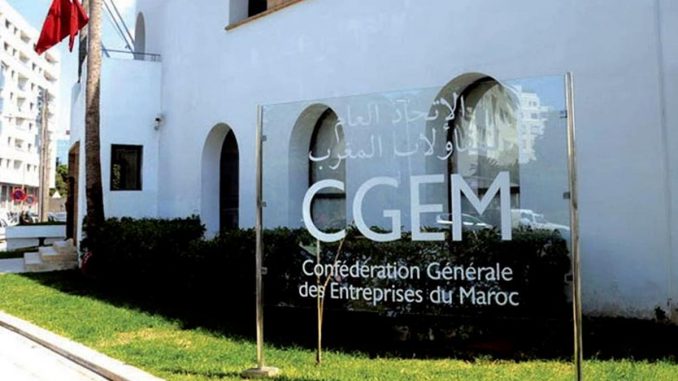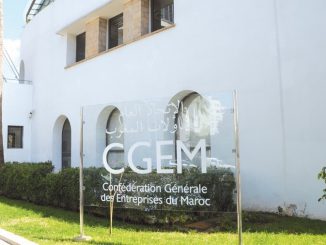
Chakib Alj has been at the head of the General Confederation of Moroccan Businesses for a little over four months. We already see an open, modern, proactive, pragmatic and efficient CGEM. Flash back.
A little over four months after taking over the reins of the employers’ association, Chakib Alj showed very early on that he was now assuming the fullness of his function as President of the CGEM. Last March, he took a strong position. Alerting to the threats of the economic crisis due to the new Coronavirus on the Moroccan economy, he did not hesitate, in a letter addressed to the President of the GPBM (Professional Grouping of Banks of Morocco), to evoke a gap between the communiqué of the Economic Watch Committee and the reality of the treatment of the files of postponement of the banking deadlines of the companies impacted by the crisis induced by Covid19 . This reassures all those who doubted the presence of a pilot in the employer’s plane. One company boss confided that the managers were expecting concrete actions from the banks regarding the application of the support measures taken within the framework of the Economic Watch Committee (CVE). “By sending this letter to the banks at the very beginning of the crisis, the new Chairman was in his role. Since then, the banks have very quickly jumped on the bandwagon. All this is now behind us, since the banks have distributed more than 10 billion DH”, explains a member of the CGEM Board of Directors. Elected on 22 January last with Mehdi Tazi as General Vice-President of the CGEM for three years, Chakib Alj is a man of the field, genetically apolitical, pragmatic and of consensus. A man of action, not rhetoric. A major industrialist, this 54-year-old Casablancan began his career in 1987 with the Société nouvelle des moulins du Maghreb (SNMM), an institution more than a century old which he has developed considerably. An industrialist accustomed to taking risks, he built up a reputation first in the flour-milling industry, before diversifying his activities towards industry and services. A seasoned businessman, this father of four invests in 13 economic sectors such as poultry farming, livestock feed production, white meat processing and delicatessen production, transportation and logistics, hotels and restaurants, and renewable energy. Very present in the field, also at the head of an industrial group directly employing more than 2,000 people, the bosses’ boss is also an active member, for more than 25 years, in several Federations and Professional Associations such as the Interprofessional Federation of Cereal Activities (FIAC), which he had to lead for seven years, or the Federation of Professions in the Distribution of Consumer Goods (TIJARA 2020). That is to say that before his appointment as President of the CGEM by his peers, Chakib Alj already knew the institution well since he sat on its Board of Directors for 7 years as President of the National Federation of Flour Milling (FNM). As soon as he was installed, the one who emphasizes his complementarity with its General Vice-President, Mehdi Tazi (CEO of the insurance broker Beassur Marsh Morocco), began to develop its 2020-2023 program, which was decided after this duo had carried out, during its campaign, about fifty meetings to sound out the expectations of the sectoral federations and the regional branches of the CGEM. This roadmap is structured around four axes.
The first area is the removal of constraints on companies of all sizes and regions, particularly those operating in industry. The Moroccan market must be regained for industrial companies. However, challenges remain to be met, in particular the facilitation of access to the public market and the development of consensual solutions for the integration of the informal into the formal sector. Chakib Alj also committed himself to improving the conditions in which entrepreneurs operate, with a particular focus on TPME. Among the projects planned in this direction, the development of bold solutions for the financing of the TPME, the radical improvement of payment deadlines as well as the dematerialization of administrative procedures to further simplify procedures. The second axis defined, concerns the opening of new markets for VSEs and SMEs by setting up efficient export mechanisms and taking advantage of the opportunities offered by new sectors such as the social and solidarity economy, the green economy and 5G technology. The President of the CGEM also promised, through the 3rd axis of its programme, the adaptation of the skills of companies to the challenges of today and tomorrow. To this end, we can mention the alignment of labour regulations with the flexibility needs of companies, the reflection on the labour code or on the regulation of the right to strike. In the 4th part of his programme, Chakib Alj promises to offer CGEM members impactful services. Today, what is the state of play after a little more than three months at the head of the employers’ confederation? It must be said that these months spent at the presidency of CGEM have been very intense in activity for the CEO of the SNMM. Indeed, on the one hand, the economic situation is particularly tense and the national institutional framework is at the heart of important reforms, on the other hand, Chakib Alj wanted to impose on the CGEM a new, denser rhythm, in line with the expectations of the economic fabric. However, despite the fact that he does not have much room for manoeuvre in passing on the proposals, he set about removing the obstacles to business development as a priority. Thus, it has invested a great deal of effort to improve payment times in the public and private sectors through the bill amending and supplementing Bill 49-15, whose adoption is now only a matter of time. Indeed, according to CGEM estimates, the amount of unpaid debts is close to 420 billion DH, money that does not circulate in the economy and which is sometimes frozen by bad payers as free credit. Thus, the CGEM has proposed that the payment deadlines be fixed in a first stage at 120 days, the time that the commercial partners get used to, before reducing them to more reasonable deadlines. It also recommended the application of a fine, as few companies demand late payment penalties from their customers. This fine will replace the statutory late payment penalties. Among the priority and urgent issues that the new bosses’ new bosses have tackled is the financing of MSMEs. For this category of companies which has much more difficulty in accessing credit or other sources elsewhere, the CGEM has made concrete efforts to support entrepreneurs to start their business. It has thus set up an offer called “1st Order” which is addressed to all entrepreneurs benefiting from the INTELAKA programme, as soon as the bank’s financing agreement is signed. This offer provides for a 30% deposit on order and payment on delivery or receipt (no payment deadline). Moreover, the CGEM, which actively participated in the launch of the INTELAKA offer, intends to continue this project. Thus, it is working in collaboration with the Caisse Centrale de Garantie (CCG), on the implementation of new financing and guarantee tools targeted according to the sectors of activity in favour of SME.
No less important is the other work in progress:
communication, which also plays an essential role in this sense. Chakib Alj, who promised a strong CGEM and committed employers, has taken action to make the CGEM and the values it defends better known to the general public, who must have all the keys to understanding the role and message of entrepreneurs, so that employers are no longer labelled as a closed club. “This is an essential issue, especially when debates as important as those we are currently experiencing are posed with the economic and health crisis due to the Coronavirus,” explains a source close to the management team. A little more than a month and a half after being elected head of the CGEM, Morocco has been affected by the pandemic of this new virus, just like the rest of the world, and is suffering the health and economic consequences. In the face of this unprecedented situation, Chakib Alj represents the voice of companies of all sizes, all sectors and all regions, and defends their interests, particularly within official bodies such as the Economic Watch Committee (CVE), by proposing measures to preserve jobs and businesses. To date, the CGEM presidency has participated in the 8 meetings of the CVE. After having obtained the suspension of the payment of social security contributions and the introduction of a moratorium on the reimbursement of bank loans in favour of companies, from the very first meetings, the CGEM was able to obtain other concessions during these meetings. In parallel to the consultations within the CVE, the presidency of the employers’ confederation has multiplied meetings with the federations, the CGEM-Regions, the Commissions and the Parliamentary Group. Today, the time has come for economic recovery. The employers’ confederation has proposed a crisis exit plan, which it has drawn up thanks to the involvement of all its components. The 125-page document lists 25 sectoral recovery plans and more than 500 proposed measures. Thus, for the CGEM, the recovery must be part of a new Pact between the State, the Citizen and Business, whose watchwords would be Trust, Transparency, Efficiency and Inclusion.
Chakib Alj hopes that the proposals of the CGEM recovery plan will inspire the CVE (Economic Watch Committee) and the Government in the coming days. For the CGEM, which estimates that the recovery will take at least a year if these measures are implemented, the recovery will require an envelope of 100 billion DH (60 billion in the form of “Damane Relance” credits, 10 billion in support to public companies, 10 billion in aid and subsidies and an investment fund of more than 10 billion to recapitalize companies). The aim is to enable companies to smooth out losses while having the liquidity needed to restart.
The Covid-19 crisis revealed a perfect harmony between the State and the employers’ confederation. Indeed, after the press briefing by videoconference on 27 May to detail the CGEM recovery plan, Chakib Alj, at the end of a meeting of the Board of Directors on 28 May, announced that he and the entire Office of the confederation had been invited for an audience at the Royal Cabinet, in the presence of several members of the Government. He stated that the Sovereign had “given his High Instructions for a strong mobilization of the State to accompany economic operators in the success of this recovery”. The President of the CGEM also launched within this meeting, an appeal to economic operators to continue their commitment and mobilization for the success of this historic turning point. Mohamed Benchaaboun, the Minister of Economy and Finance and Chairman of the Economic Watch Committee (CVE), who attended the last videoconference, thanked the CGEM’s involvement in the CVE and the constructive spirit that marked the cooperation to be able to act within very short deadlines and take important decisions for the benefit of companies and employees. He also congratulated the CGEM for its economic recovery plan which was “carried out according to an approach which has the advantage of being bottom-up and which constitutes an extremely rich reference frame and a working tool for all the sectors…This recovery plan constitutes an extremely rich reference frame for the preparation of future actions and also constitutes a working tool for all the sectors”.
Another sign of confidence in the CGEM, the employers’ confederation has been entrusted, on Royal Instructions, to coordinate, in partnership with the Ministry of Health and the Ministry of the Interior, a very large campaign to screen private sector employees for COVID-19. This operation, which began on 3 June 2020, aims to limit the risk of the virus spreading in companies and guarantee a safe and serene resumption of activity. The adherence of companies to this massive screening campaign is a prerequisite for a safe and serene recovery.
It is one of the first projects that Chakib Alj and his team have been working on since their arrival at the head of the Confederation. At the beginning of March this year, the bosses’ boss lifted the veil on the “1st Order” offer, an initiative aimed at young entrepreneurs and beneficiaries of the Integrated Business Support and Financing Programme. As soon as their financing has been granted by a bank, young entrepreneurs via this formula can be supported in particular in the post-financing phase of their business and benefit from a support system enabling them to start their activity. In addition, it provides for a 30% deposit on order and payment on delivery or receipt (thus excluding the payment deadline). An offer that enables CGEM to fully contribute to the “Intelaka” programme, launched under Royal Instructions and supporting more particularly very small and medium-sized enterprises. This program has been allocated a budget of 8 billion DH over three years, accompanied by a range of key measures, including the capping of exit rates at 2%, reduced to 1.75% for the rural world, the abandonment of any form of guarantee except those related to the project, the simplification of procedures for processing applications for funding, as well as the granting of a preferential rate of 0.1% for insurance premiums “death / total disability / borrower”.
> Payment periods: the acceleration of the payment process
If there is one issue that figures prominently on Chakib Alj’s desk and that he and his staff have taken to heart, it is that of payment delays, whose effects are disastrous for companies’ cash flow, in addition to impacting their investments and weakening their sustainability. The employers, who have not stopped sounding the alarm on the volume of inter-company debts (the latter having reached the bar of 420 billion DH at the end of 2019) and who have called for a review of the law governing payment deadlines, in order to penalize companies that fail to pay. The CGEM has recently finalized a draft amendment to the law governing payment periods that it submitted to the Minister of Economy, Finance and Administrative Reform and that it would like to see included in the draft law under preparation. The Confederation which specifies that this text tends to improve the situation in a reasoned manner in a particularly difficult economic context, given the health crisis linked to Covid-19. Among the proposed amendments, the employers propose a maximum transitional payment period of 120 days. Beyond four months, any delay in payment will be punished by a non-deductible fine to the benefit of the Treasury at a rate of 3% for the first month of late payment, increased by 1% per additional month and capped at 10%, and which will be paid into a support fund for financing entrepreneurship. In addition, the
Confederation is proposing the introduction of the “name and shame” principle, which has proved its worth in the countries that have adopted it and which consists of naming bad payers and publishing their names. Still according to the CGEM, certain provisions still need to be improved, in particular the procedure for introducing derogatory payment periods for certain sectors of a specific and/or seasonal nature, as well as the payment conditions of public order holders and, in particular, works contracts. This draft amendment comes at a time when the volume of outstanding receivables from companies is increasing, with a heavy impact on their cash flow and their ability to borrow from banks.




Be the first to comment